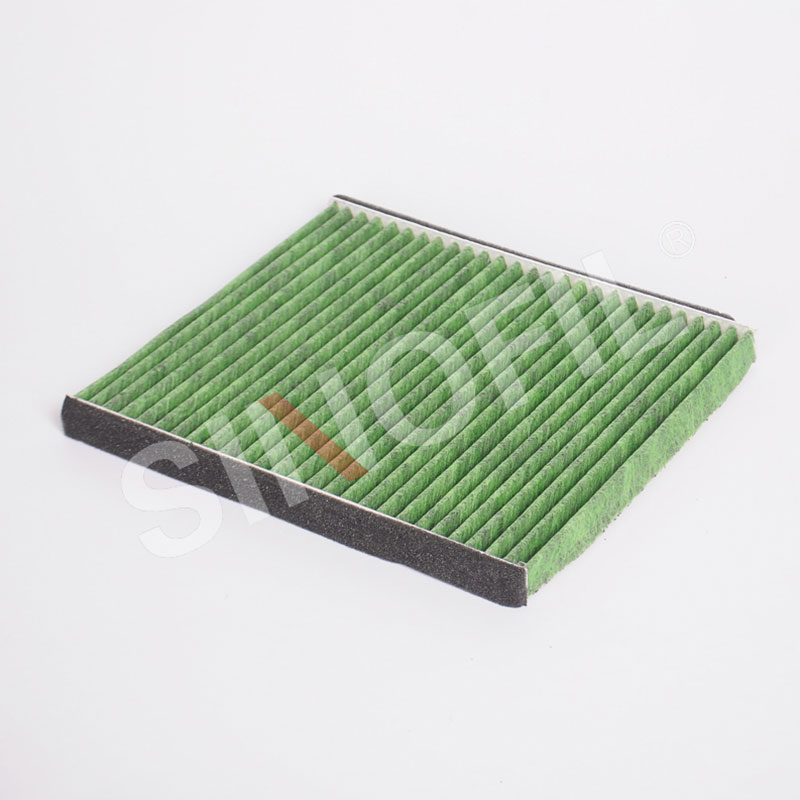Home / News / How to dispose of used cabin filters in an environmentally friendly way?
Disposing of used cabin filters in an environmentally friendly way is important to minimize their impact on the environment. Cabin filters, especially those containing synthetic materials, activated carbon, or other specialized filtration media, can pose environmental challenges if not disposed of properly. Here are some steps to ensure environmentally friendly disposal:
Particulate Filters: Typically made of synthetic fibers, cellulose, or a combination. These may not be biodegradable.Activated Carbon Filters: Contain layers of activated carbon along with other materials, making them more complex to recycle.HEPA Filters: Often made with fine mesh and sometimes have fiberglass or plastic components, which are not easily recyclable.Knowing the filter type helps in determining the most suitable disposal method.Some regions have specific regulations regarding the disposal of automotive parts, including cabin filters.Contact local waste management services to inquire about guidelines for disposing of automotive filters. They may offer specific instructions for sorting, recycling, or disposing of cabin filters.If feasible, disassemble the filter to separate recyclable materials such as metal or plastic casings from non-recyclable filter media.
Metal and certain plastics can be recycled through regular recycling channels, while the filter media may need to be disposed of as general waste or hazardous waste, depending on its composition.Some automotive shops, dealerships, or filter manufacturers have recycling programs that accept used cabin filters.Contact your filter manufacturer to see if they have a take-back program or partner with recycling facilities to handle used filters.Look for local recycling centers that specialize in automotive waste. They may have systems to handle filters, especially those with hazardous or non-biodegradable materials.
If the filter contains hazardous materials (e.g., activated carbon filters that have absorbed harmful chemicals or gases), it should be treated as hazardous waste.Take such filters to a designated hazardous waste disposal facility, which is equipped to handle materials that may leach harmful substances into the environment.Place used cabin filters in a sealed bag or container to prevent the spread of trapped dust, debris, or harmful particles during transportation and disposal.Label the bag or container if it contains hazardous materials or contaminants, especially if required by local regulations.
Consider using cabin filters that are designed to be more environmentally friendly. Some manufacturers offer biodegradable filters or reusable/washable filters that reduce waste.Reusable filters can be cleaned periodically, reducing the need for disposal and minimizing environmental impact.Encourage vehicle owners and automotive service providers to follow environmentally responsible disposal practices.Provide information about the importance of proper disposal, recycling options, and the impact of incorrect disposal on the environment.

Do not burn or incinerate used cabin filters, especially those containing synthetic fibers or activated carbon, as they may release toxic fumes or contribute to air pollution.Some non-contaminated filters can be repurposed for DIY projects, gardening, or craft applications. However, this should be done carefully, considering the filter's previous use and potential contaminants.Advocate for automotive part recycling initiatives in your community or region.Support manufacturers who implement eco-friendly practices in filter production, including the use of sustainable materials and recycling programs.
Disposing of used cabin filters in an environmentally friendly way involves understanding their composition, following local regulations, recycling whenever possible, using proper disposal sites, and exploring reusable or biodegradable options. By taking these steps, you can help reduce the environmental impact of used cabin filters and promote sustainable practices in automotive maintenance.



 English
English Español
Español











 ++86 183 3391 1399
++86 183 3391 1399


 +86 183 3391 1399
+86 183 3391 1399
 +86 187 3296 0060
+86 187 3296 0060 Wangshigong Village, Wei County, Xingtai City, Hebei Province, China
Wangshigong Village, Wei County, Xingtai City, Hebei Province, China
